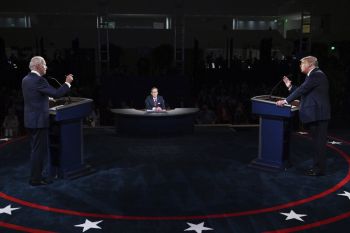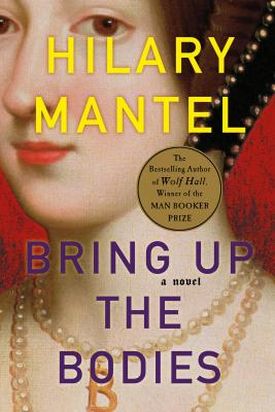Of men & manners
From The New CriterionHow many, I wonder, of those who had been abusing President Trump on Tuesday for his violation of civilized norms during his debate with Joe Biden were the same people who, on the following Friday, were leaping for joy (like the actor Dominic West) at his diagnosis with the Covid-19 virus — or, like Hillary Clinton’s former spokesperson Zara Rahim, wishing for him to die of it. Maybe publicly hoping for the death of your political opponent (or “enemy” as Mrs Clinton herself prefers to put it) doesn’t count as boorishness on the same scale as interrupting him in debate, but I don’t think I can be the only one who was inclined to take the Trump-haters’ over-the-top outrage at his debate performance with more than a grain of salt, even before his diagnosis with the disease.
Here, for instance, was John Harris in the next day’s Politico: “An Epic Moment of National Shame: The Debate Was an Embarrassment for the Ages.” You may have noticed, as I did, that the media seem to have discovered rather a lot of Embarrassments for the Ages during the last four years. In fact, they’re as common as blackberries these days, which might tend to lessen their shock value a little. Yet the embarrassing one himself never seems to be the least bit embarrassed. A bit like the media themselves, come to think of it. They have, as some of us believe, at least as much to be embarrassed about as the President, but they are no more inclined to show the least embarrassment, or admit to any but the most trivial mistakes or false steps, than he is. We’ll just have to be embarrassed on their behalf, as they are, or profess to be, on behalf of the President.
For another thing that the media have in common with their bête noire is that they are, and ever-more obviously, performance artists. Here’s how James Poniewozik of The New York Times characterized Mr Trump’s first two days at the Walter Reed National Military Medical Center at the beginning of October:
Donald J. Trump has told aides to think of every day of his administration as an episode in a television show. That production, it turns out, does not take sick days. The president’s diagnosis and treatment for Covid-19 has unfolded as TV drama, some of it stunning, some baffling — and some of it crafted by Mr. Trump’s own producers, in a surreal but characteristic attempt to try to wrangle control of reality through pictures.
This treatment of the President’s illness through the medium of a television review, suggested by the rubric of “Critic’s Notebook,” is now as familiar a device as the representation of his administration as “a reality TV show,” and the shock of both, if there ever was any, has long worn off. But the Times, especially, never seems to get tired of it. For they are unlike Mr Trump in one respect, at least, which is that they are apparently still unaware that they, too, are putting on a show every day.
Some may say that the media are only pretending not to know of their own fakery and pretension, but I think this does them an injustice. Their lack of self-awareness is too well-precedented and documented to be a pretense. Rather, as I believe, the reason for their irony-blindness is that they are bewitched by that word “reality” in Mr Poniewozik’s critical essay. “Pictures,” particularly those of the President’s fabrication, are always at odds with “reality” in the pages of the Times — since reality (or “Truth,” its alter ego) is seen as belonging to that venerable institution by definition. Reality is always what they say it is, and because they say it is. As for so many others of less intellectual eminence, both in the media and out of it, reality is proprietorial nowadays, and so always comes with the Times’s own brand on it.
Thus it should come as no surprise that that newspaper’s approach to the President’s illness was couched in terms of reality versus illusion from the get-go. Its headline on the day after his diagnosis was: “A White House Long in Denial Confronts Reality.” The alleged “denial” here was gleaned from the work of Bob Woodward, of a rival paper, who the previous month had offered it as the “bombshell” revelation of his latest tedious White House chronicle, titled Rage, that the President had sought to “play down” the seriousness of the pandemic in the first instance in order to avoid a panic. Of course there had never been any denial of the virus’s reality — though at one point early on in Covid-19’s infamous career the media had misconstrued a presidential attack on a previous media misconstruction so as to affect to believe that he had called it a “hoax.” In fact, he had only denied, hesitantly and briefly, that the mortal danger threatening anyone who caught it was such as to justify the most extreme and economically ruinous measures against contagion with it. Some of us still wish that he had stuck more firmly to this denial.
But never mind that. With typical media illogic and with no demur from Mr Woodward himself, at least that I saw, Mr Trump’s “denial” was now being treated is if it had been a denial of the fact that he, like everybody else, was potentially susceptible to infection — a “reality” which then caught up with him when he came down with it the day before. Of course, Maureen Dowd could not but get in on the act in her column that ran in the same day’s Times: “Reality Bursts the Trumpworld Bubble.” For her the President’s diagnosis was an epochal event, emblematic of his whole life and career. “For his entire life,” she wrote, “Donald Trump has stayed one step ahead of disaster, plying his gift for holding reality at bay. He conjured his own threadbare reality, about success, about virility, about imbroglios with women, even about the height of Trump Tower.”
You can guess the rest. At last, after so many false starts and so many disappointed hopes of the media, this “threadbare reality” had now been exposed as the sham it always was. “Now,” she continued, “in a moment that feels biblical, the implacable virus has come to his door.” I especially like that “biblical” feeling. Only Ms Dowd could have thought of that, I fancy. And yet she apparently has no clue that this moment of melodrama could be anything other than echt “reality” with the Times’s own ironclad guarantee and blue ribbon seal of approval on it. She can only ever be blissfully unaware that more factitious realities than Mr Trump’s “own” are beginning to look just a bit threadbare these days.
The paper also sought to get some mileage out of the story by treating it, and its alleged “reality” as an opportunity to sidetrack a worrying tendency of the election campaign (remember that?) to get onto subjects that might be more favorable to President Trump — the economy, the leftism of the Democrats, the corruption of Joe Biden and his family, the violence in the streets — and bring it back to what they see as the most favorable ground for their side. A “Political Memo” by Alexander Burns, written within hours of the diagnosis’s being made public, purported to observe that “Trump’s Illness Makes It Clear: This Election Was Always About the Virus.” The article’s sub-head explained that, “For all of the tumult of the race between President Trump and Joseph R. Biden Jr. — and for all of the other currents battering the country and its leaders in an election year — the issue of the virus has never retreated as the overwhelming factor.”
Well, “overwhelming” is laying it on a bit thick, but that’s the Times for you. Never use a hammer when a sledgehammer will do. But with a fine disregard for all such patented realities, this election, like others, will be “about” what it is about and not, or at least not necessarily, what The New York Times keeps insisting it is about. Only 48 hours earlier it had been, according to the media, all about the President’s bad manners and “unpresidential” behavior in picking on poor, addle-pated Joe Biden during the debate — or that and a Cook’s tour of all the golden oldies of the media’s accusations against the President over the past four years which resurfaced in it, from his alleged “lies” (“Everybody knows you’re a liar,” Mr Biden had averred during the course of the debate) to his alleged white supremacism, which was brought up both by Mr Biden and the alleged “moderator,” Chris Wallace.
Somehow, in the media’s view, such insults didn’t count as discourtesies themselves, or even as provocations to the President’s discourtesy, which is always represented as being gratuitous — naturally flowing from his badness of character, which is always contrasted with the goodness and purity of his opponents. So fixed is this now familiar black-and-white portrait in the imaginations of those who still read, watch or listen to the media uncritically, that a neighbor of mine has hung a Biden banner over the door of his house with the motto (I kid you not): “Truth over lies.” Of course I live in the swamp that Mr Trump, beset on all sides by the media, the Democrats and the permanent government or “deep state,” has so far struggled to drain. But “Truth over lies,” like his egotism and uncouth manners and his supposed responsibility for mishandling the response to the virus, are central to the media narrative, which is always going to be, in the media’s view, what the election is “about.” This isn’t to say that they are necessarily wrong. Obviously the media are not, even after three years of fake news about Russian “collusion,” without considerable power to keep the public’s attention fixed on what they want it to be fixed on.
As I write, my impression is that their own uncivil gloating about Mr Trump’s having fallen victim to the virus is so widely shared as to have obscured if not obliterated the American people’s natural tendency to feel sympathy with the misfortunes of their leaders and public men and women — so much in evidence in the media’s outpouring of sorrow and regret after the death of Supreme Court Justice Ruth Bader Ginsburg only two weeks earlier. One “snapshot” telephone poll taken on the day after the diagnosis found that 40 per cent of self-identified Democrats were “happy” to hear of the President’s illness. Forty-one per cent were “indifferent.” Such an apparent disparity might give rise to the uncharitable suspicion that at least part of the regret for Ms Ginsburg’s passing was owing to her death’s having given the hated Orange Man the opportunity to appoint a third Supreme Court justice no more to the Democrats’ liking than the previous two.
The media are determined to prove the truth of the old proverb: give a dog a bad name and hang him. Knowing as they do that, having been given as bad a name as any public figure since Richard Nixon, Mr Trump can never do anything right, so why should he expect to be the beneficiary of even the chilliest of polite good wishes when he catches a potentially fatal disease? Besides, his illness affords the media an opportunity, which they can hardly be expected to pass up, to claim that it was his own fault, and a condign punishment for his pushback against the media’s own Project Fear about the virus. A Reuters/Ipsos poll taken within 48 hours of the diagnosis purported to find that “a majority of Americans think Trump could have avoided infection if he had taken the virus more seriously.”
Whether or not they can be equally successful in selling Joe Biden as a plausible alternative to Mr Trump remains to be seen at this writing. The “presidential” demeanor that was the implied promise of the former in his rebuke to the latter for being “unpresidential” may run the risk of looking just a bit too much like the dignified appearance of the waxworks dummy that, some would say, Mr Biden already too much resembles. I’m reminded of the description of Governor Thomas E. Dewey, sometimes attributed to Alice Roosevelt Longworth, as looking like “the little man on the wedding cake.” And everybody knows what happened to him when, thirty years younger than Joe Biden and in all the vigor of youth, he took on a pugnacious and ill-mannered Harry Truman.
Admittedly, this is not the country that it was in 1948, when our fathers and grandfathers had just done more than a bit to win a titanic, two-front World War and that, therefore, might be supposed to be more willing than it is today, now that it is already if unofficially being led by its new, “snowflake” generation, to take a fighter to its heart. In the intervening period, corresponding to the lifetimes of the two candidates as well as your correspondent, America has undergone a process of what Rush Limbaugh calls (in connection with American football) “chickification” — which is essentially what makes the usually shrewd Daniel Henninger of The Wall Street Journal’s editorial page think that Mr Biden’s rebuke to his opponent during the debate — “Will you shut up, man?” — has all but clinched the election for good old Joe.
Other than driving turnout from a polarized electorate, these presidential debates are about winning at the margin by pulling over undecided or leaning voters. This especially includes women, with whom Mr. Trump lately has been underwater and sinking in battleground-state polls. Here’s guessing few women migrated to the Trump column Tuesday evening.
He may, of course, be right. Certainly that would be the conventional wisdom on both right and left these days. Yet I still have some doubts that this female perspective on things is the work of the chicks themselves, some of whom surely must still appreciate a manly man more than the pack of girlie men who nowadays seek to flatter them. Of course there are many women who are repelled by displays of masculine thumos — which is the Greek name given by Harvey Mansfield in his book on Manliness to that untamable and aggressive spiritedness typical of men in a state of nature — of the sort engaged in by Mr Trump, to the universal horror of the media, in Cleveland. But such women were never going to be persuaded by Mr. Trump anyway — that nasty, horrid brute of a “bullying nut.” The epithet was Peggy Noonan’s until, after the diagnosis, she changed it to “belligerent nut.” Belligerent means “war-making” — and who wants that in a Commander-in-Chief?
But there is another kind of woman — like Alice Roosevelt Longworth, perhaps, whose presidential papa was also faulted for excessive masculinity — who is probably not much interested in politics because politicians are generally assumed by her, not inaccurately, to be weasely characters and canting, lying hypocrites. It is not beyond imagination that such women might actually be impressed by the straightforward, attacking and counter-attacking style of a man like Donald Trump who, to an unprejudiced observer, has been much less bullying than bullied by the cowardly, sneaking, underhanded media for the last four years, and who tells people, in defiance of media “reality,” not to be afraid of the too-much dreaded virus. You may say that I’m a dreamer, but I’m not the only one.
Discover more from James Bowman
Subscribe to get the latest posts to your email.







